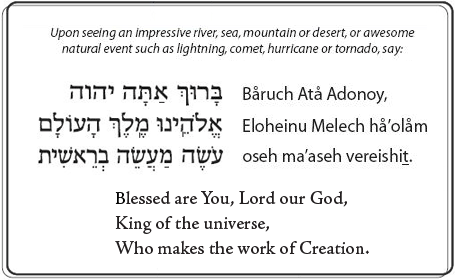 Iran’s Attack on Israel
Iran’s Attack on Israel


14 min read
Some journeys are smooth and some are bumpy. It's best to go the Jewish way.
Did you know that Americans spend $1.6 billion dollars a day on travel expenses!?1 Some people love traveling; others despise it. But whether by car or by foot, by boat or by plane, by bike or by train, everybody has somewhere to go. How is all this impacted by Jewish law?2
Jews are no strangers to traveling. For thousands of years, Jews have been wandering from one country to the next, seeking some place to rest their weary feet. There are few places in the world where Jews have not tried to settle. Jewish wandering strengthened our resolve and imbued us with an unshakable sense of survival. The mystics say that Jews were scattered to the four corners of the world, in order to "gather the sparks of holiness" in each location,3 and to contribute a moral and ethical component to each region.4
Unquestionably, whenever a person travels, it broadens his horizons and increases his understanding of God's world. On a mystical level, any place that a person travels to was destined for his soul to encounter.5
According to Jewish tradition, one who changes his locale has transformed his mazal (fate).6
It is a good idea to maintain contacts with the local Jewish communities wherever you'll be. They can provide information about synagogues, kosher food, and Shabbat hospitality.7
If a married man is traveling overnight without his wife, he is obligated to dedicate time to her emotional needs before departing.8 A man should not travel during the 24 hours prior to his wife going to the mikveh. Within the first year of his marriage, a husband is not permitted to travel on an overnight trip (other than for the sake of a mitzvah) unless his wife consents.9
During the first week after the burial of an immediate relative, a mourner is not permitted to travel – neither for business nor pleasure.10 He is allowed to travel in order to sit shiva with the rest of the family.11 He is also permitted to travel to avoid a significant financial loss.12 Vacation trips are not appropriate within a year after losing a parent, or within a month following the loss of a spouse, sibling or child.13
Before one leaves on a journey, it is proper for him to be escorted out. (This is discussed in Interpersonal Responsibilities – Part 2.) Meaningful Torah-oriented conversation should be exchanged upon leaving.14
When undertaking an intercity journey, travelers recite a special prayer for safety and success.15 In the prayer, one may also mention anticipated perils that will be to his personal journey.16 This prayer is said once per day.17 It should be said toward the beginning of the trip, but only after leaving the confines of the city.18
Each Jew has an obligation to pray each day – minimally the morning blessings, the Shema, and the Amidah. Serious prayer during travel is often very challenging. Sometimes there is no practical place to stand. Often, it is difficult to concentrate on the prayers.
It is important to try to find the place (and time) that is most conducive toward focusing on prayers. If possible, choose a place where you will not be disturbed by others,19 nor will you be the cause of disturbance. Also make sure that the area is clean20 and that nobody nearby is inappropriately dressed.21
It is forbidden to set out on a journey if you won't be able to pray properly at the right time.22 However, it is permitted to travel to a place where you won't be able to pray with a minyan, if the journey is for a good reason.23
It is particularly challenging to pray during air travel. If possible, try to schedule flights so that you can pray before or after the flight. It is improper to make a minyan on an airplane if it will inconvenience other travelers.24 Rather, a person should pray while sitting at his seat, if there is no way to have a proper focused prayer25 without disturbing others.26 If possible, one should try to stand for the parts of prayer when one is meant to bow.27
What if one is flying over (many) times zones – how is the time of prayer determined? It is dependent upon the time on the land (or ocean) directly below you.28 As this is often difficult to figure out when in the air, it is best to err on the side of caution. Consequently, when you see the sun rise from the airplane, remember that your altitude causes you to see the sun earlier than you would see it from the earth below. So allow extra minutes before praying the Amidah. Similarly, don't wait until late in the day to pray Mincha, since the sun will set earlier on land than it will appear to from the airplane. One should be especially aware when traveling eastward, as the afternoon progresses quickly.
When traveling in a car close to the end of prayer time, if it is difficult to stop on the side of the road and pray properly, one may pray while sitting in the car.29 However, the driver may not pray (or recite Grace After Meals) while driving, as he will not properly focus on his prayer, and he may endanger himself and others.30
If a traveler wakes up in a place where no water is available for netilat yadayim, he should wipe his hands on something and proceed to pray.31
Through the millennia, the Torah has proven applicable to every place and time. As the Torah teaches us to maximize our time, even travelers are expected to study Torah. If it is difficult to concentrate on a book during travel, one could listen to Torah tapes.32 Indeed, this is a fulfillment of the verse to study Torah "while going on the way."33
There is also a kabbalistic idea to "sanctify" a particular spot with Torah study.34 Whether in the Grand Canyon or in Moscow's Red Square, in the Rocky Mountains or in Auschwitz, it is appropriate to study Torah in that place.
Rabbi Samson Raphael Hirsch was the spiritual leader of German Jewry in the 19th century. Toward the end of his life, he decided to make a trip to see the Alps. As he was old and unable to travel easily, his congregants asked for an explanation. He explained that in a short time he will be facing the heavenly tribunal and the Almighty will confront him with the question, "Samson, did you visit My beautiful Alps?"
God created a beautiful world because He wants us to enjoy it and become more appreciative of the Creator. To facilitate this appreciation, various blessings are recited upon being awed by the wonders of creation. As such, one who is not impressed by these phenomena (e.g. as a result of familiarity), does not say these blessings.35
One recites the following blessing upon seeing an impressive river, sea, mountain or desert, or an awesome natural event such as lightning, comet, shooting star, meteor shower, hurricane or tornado:36

A new blessing is said only if the 30 days has passed since last visiting this site. However if another body of water is seen, a new blessing may be recited,37 unless it was during the same leg of a journey.38
Upon viewing a mountain from an airplane, where its height cannot be fully appreciated, this blessing should not be recited.39 The blessing over observing an impressive body of water may be made from an airplane.40
There are numerous other laws pertaining to the conditions that these blessings may be made. For further study, see the Aish Academy course on Blessings. In all cases of doubt as to whether the blessing should be said, it should be recited without the name of God.41
If a traveler wants to eat bread, he must first procure water to wash his hands. (See the laws of netilat yadayim.) What if there is no water immediately available? If you expect to have access to water within 72 minutes further in the journey, or if you can attain water by going up to 18 minutes out of your way, you should do so.42 Otherwise, one may eat the bread without touching it – i.e. by wrapping either the bread or your hands (e.g. with gloves).43 This approach could also be utilized if one is in an unsafe area,44 or would have to separate from his fellow travelers in order to get water.45
Upon safely completing a significant journey, one should thank God for the successful trip. This blessing, known as Birkat HaGomel,46 is recited after any air travel47 or lengthy boat trip.48 Sefardim also recite this blessing after completing a lengthy car or train ride, but Ashkenazim only do so only if they faced particular danger along the way.49
The text of the HaGomel blessing is:

This blessing may only be recited in the presence of a minyan,50 typically after the reading of the Torah in synagogue.51 The blessing should be said at the first such opportunity, ideally, within three days of the conclusion of the journey.52 If many people need to say this blessing at the same time, ideally one person should recite the blessing on behalf of them all.53
The HaGomel blessing is also recited by anyone who recently underwent a dangerous experience:
God gave a treasure to the Jewish people called Shabbat and Yom Tov. These are days of rest and not for traveling. Plan your travel itinerary to ensure that you'll be in a comfortable location to properly observe these holy days.
Travel often involves unexpected delays – cars break down, flights are delayed, and there are often unexpected traffic and weather conditions. So don't plan trips on Friday unless you are certain you'll have enough time to reach your destination long before sundown. If possible, try not to make Friday or Erev Yom Tov into a travel day.55 [In Israel, one must also be mindful that a Jewish bus or taxi driver will have ample time to return home before the onset of Shabbat.]
Click on the player below to listen to a fascinating audio story about what can happen when traveling too close to Shabbat!
Shabbat in Milwaukee
During Sukkot, one is exempt from eating in a sukkah while traveling.56 Of course, if there is a sukkah readily available, one should eat there.57 A pleasure trip does not exempt a traveler from the obligation to eat in a sukkah, and it is forbidden to take such a trip if one expects that he will have to eat outside the sukkah.58 [Generally, beverages and foods not made from grains may be consumed outside the sukkah.]59
One who is traveling during Chanukah should arrange for family members to light the menorah at home.60 [If one is in a different time zone, those lighting at home should do so at a time that works for both time zones.] If there is no one in your home, and you will be on the road during the night, there is no mitzvah to light.61 Therefore, it is important to be in a home during all of the nights of Chanukah.62
One of the most fascinating issues of travel and halacha is the International Date Line. In 1941, several hundred yeshiva students and their families escaped from Nazi-occupied Europe and found asylum in Kobe, Japan. The refugees were happy to have escaped the European inferno, but they were perplexed as how to observe Shabbat in Japan. They sent letters to leading rabbinical scholars asking for guidance. Although they did not cross the conventional International Date Line (which runs just east of New Zealand), that dateline was chosen due to convenience. Perhaps the International Date Line as recognized by Jewish law was already crossed, and therefore Shabbat in Japan would have to be observed on Sunday!
There are a number of different opinions on this matter, and someone traversing the Pacific (even to Hawaii and Alaska) should consult with a rabbi.
The Land of Israel is the home of the Jewish people. For thousands of years, Jews longed to visit the Holy Land. Moses prayed 515 prayers, beseeching God to allow him to enter the land.64
Today, everyone has the opportunity to visit this special land, and there is a great mitzvah to do so.65 Because this is so important, one may even travel to Israel during inauspicious travel times, such as the beginning of the month of Av.66 (See our essay on the Land of Israel for more details.)
Some journeys are smooth and some are bumpy. If you face difficult challenges during your travels, remember that God always puts us in the right situation to grow spiritually. The experiences and tools that we acquire along the way, are just what we need to maximize the journey of life.
